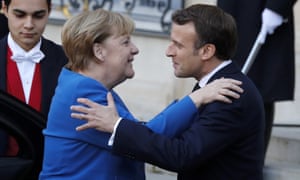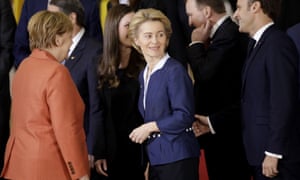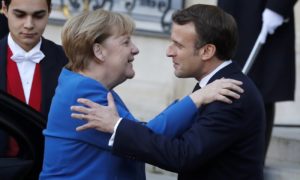As a year of big EU decisions begins, the bloc’s most important relationship is stuck in a rut

In early December, Emmanuel Macron and Angela Merkel sat down opposite each other in Gordon Ramsay’s restaurant at the Savoy Hotel, central London, for a two-hour tête-à-tête dinner. They had some talking to do.
Cordial and constructive, diplomats in Paris and Berlin said, the evening apparently cleared the air. But it will take more than a dinner to clear the structural obstacles to a relationship that is critical to what Europe can achieve in 2020.
“The Franco-German relationship is the single most important relationship in the EU and it’s in a totally toxic condition,” said Mark Leonard, the director of the European Council on Foreign Relations. “And it’s going to get worse before it gets better.”
There was always going to be a yawning gulf between the styles of Macron, 41, an ambitious, impatient and at times arrogant first-time French president, and Merkel, a cautious, pragmatic, consensus-building fourth-time German chancellor. But if, on matters of substance, their overarching visions coincide more often than they diverge, the two leaders’ very different domestic situations have compounded their personal differences, making the relationship unproductive – or worse.
Macron, halfway through his mandate at the Élysée Palace and revelling in powers that are not far short of royal, is increasingly frustrated, not just with Merkel’s slow pragmatism, but with her weakened authority since announcing she would not run again when her term ends in 2021.
Worse, her grand Christian Democrat-Social Democrat coalition is divided, bent mainly on survival and frightened even to consider fresh elections in which it would be challenged by the surging popularity of the nationalist Alternative für Deutschland party (AfD) on the right and the Greens on the left.

“Germany is in political paralysis, incapable of taking a major decision, and will probably remain so until elections in September 2021,” said François Heisbourg of the International Institute for Strategic Studies. “Hence Macron’s frustration: France has ideas; Germany is sticking its fingers in its ears.”
The makeup of Germany’s current coalition would anyway prove problematic for the French president, who himself faces re-election in 2022: the centre-left SPD dislikes his proposals on developing the EU’s military and security capability, while the conservative CDU opposes his plans for the eurozone and economic integration.
“Macron basically bet the farm on building a new relationship with Germany, reforming France and working with Berlin to reform Europe,” Leonard said. “He appointed German-speaking ministers and spent his first year wooing the Germans – but nothing materialised. So he pivoted.”
This year, Leonard said, the French president – currently trying to push through contested pension changes at home – has “not hung around for Berlin, or even shied away from upsetting it. His approach has been to launch his initiatives, try to build relationships with other countries, and involve the Germans later. It hasn’t gone down very well.”
Others, too, have been annoyed by Macron’s tendency to act first and consult later: the French president has, often alone, insisted on a shorter article 50 extension; imposed his line-up for Europe’s top jobs; vetoed EU accession talks for North Macedonia; and demanded, with the aim of keeping Russia out of China’s clutches, “a new architecture of trust and security” with Moscow.
But Berlin in particular has been vexed, culminating – after Macron told the Economist that Nato was “brain dead” – in Merkel reportedly informing her French counterpart, at an anniversary dinner commemorating the fall of the Berlin Wall, that she understood his “desire for disruptive politics” but was “tired of picking up the pieces”. Hence the Savoy dinner.
The picture is not entirely bleak. Away from the headlines, steady, day-to-day bilateral work continues. Berlin and Paris are still pushing ahead where possible, albeit incrementally.
German-French cooperation was “like two sides of an accordion”, a German diplomat said. “Sometimes you pull it apart a bit, then both sides come back together again. Each side knows they are joined to each other. And they know they can only produce a nice sound together.”
The Franco-German relationship “is certainly not in crisis”, said Heisbourg. “But in a way, it would almost be better if it was, because then we would have a real discussion, and the chance of decisions and some substantive action.”
Heisbourg added that Germany’s EU presidency, in the second half of the year, “for which Berlin surely will want to achieve something concrete”, might yet produce some progress. But Leonard was less sure.
At root, he said, the problem was structural: most French voters think neither France nor Europe is working very well for them, so Macron has “no alternative but to be an agent of change and disruption”; most Germans reckon things are going pretty well, so Merkel has the opposite imperative.
“Why this matters,” Leonard said, “is because while it’s true that France and Germany can no longer set the EU agenda and just expect all the others to follow, if there is no consensus between Paris and Berlin, really, nothing is possible.”
Ever since the 1950s, the relationship between France and Germany, the continent’s economic powerhouse and its diplomatic and military leader, has been the EU’s engine: when it works, Europe moves forward; when it doesn’t, Europe stalls.
The EU’s big decisions in 2020 – its new budget, eurozone reforms, carbon neutrality, digital taxation, relations with Russia – would be difficult even if France and Germany could agree and were prepared to act, Leonard said. “If they can’t and they’re not, it’s going to be very, very difficult indeed.”
Farewell to the 2010s…
… will the 2020s offer more hope? This has been a turbulent decade across the world – protest, austerity, populism, mass migration. The Guardian has been in every corner of the globe, reporting with tenacity, rigour and authority on the most critical events of our lifetimes. At a time when factual information is both scarcer and more essential than ever, we believe that each of us deserves access to accurate reporting with integrity at its heart.
We have upheld our editorial independence in the face of the disintegration of traditional media – with social platforms giving rise to misinformation, the seemingly unstoppable rise of big tech and independent voices being squashed by commercial ownership. The Guardian’s independence means we have the freedom to set our own agenda and express our own opinions. Our journalism is free from commercial and political bias – never influenced by billionaire owners or shareholders. This makes us different. It means we can challenge the powerful without fear and give a voice to those who would otherwise go unheard.
None of this would have been possible without our readers’ generosity – your financial support has meant we can keep investigating, disentangling and interrogating. It has protected our independence, which has never been so critical. We are very grateful.
You’ve read 5 articles in the last four months. More people than ever before are reading and supporting our journalism, in more than 180 countries around the world. And this is only possible because we made a different choice: to keep our reporting open for all, regardless of where they live or what they can afford to pay.
As we end 2019 and enter a new decade, we hope you will consider offering us your support. We need this so we can keep delivering quality journalism that’s open and independent. And that is here for the long term. Every reader contribution, however big or small, is so valuable. Support The Guardian today from as little as €1 – and it only takes a minute. Thank you.





